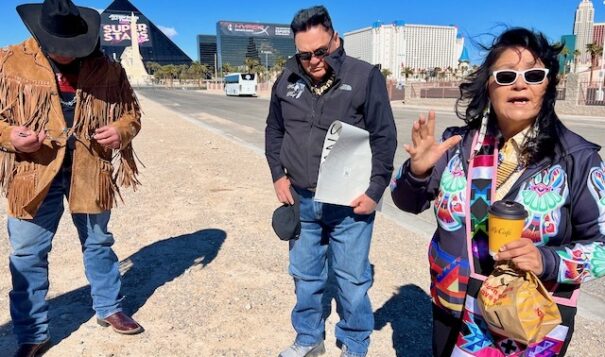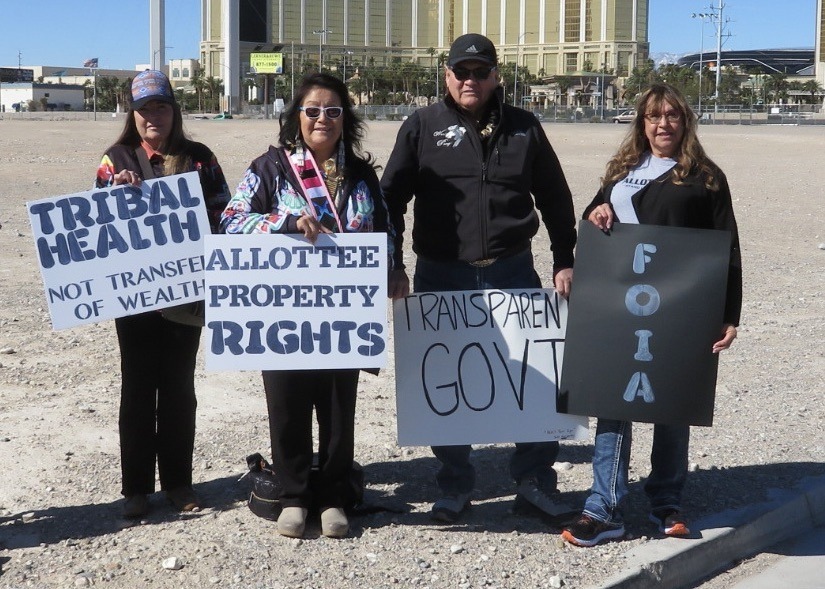Opinion Advocates for ideas and draws conclusions based on the author/producer’s interpretation of facts and data.
Uncle Elmer’s letter from the Bureau of Indian Affairs
 Todd Hall, left, Ron Brugh and Carol Good Bear, pictured in Buffalo's Fire file photo in Las Vegas, April 4, 2023. Photo Credit/Jodi Rave Spotted Bear, Buffalo's Fire
Todd Hall, left, Ron Brugh and Carol Good Bear, pictured in Buffalo's Fire file photo in Las Vegas, April 4, 2023. Photo Credit/Jodi Rave Spotted Bear, Buffalo's Fire
Recently, I got an email from my Uncle Elmer Fredericks, Mandaree, N.D. I respect the man; he is a Tribal elder who has worked hard all his life to provide for his family. He is the kind of man who isn’t afraid to face a blizzard, or breathe in frigid arctic North Dakota air, feeding cows. He has been known to work dawn until dusk and sweat under the hot sun, breathing in dust, putting up hay.
He lives off the land, like his fathers before him. He is a landowner or “allottee” as we are known in Indian Country. He is a traditional person, ever mindful of the teachings of his elders and a patriotic citizen of the United States of America. Elmer is a businessman. He believes in the U.S. Constitution, loves the outdoors and his Indian ways.
His handshake still means something. The Code of the West is a way of life where a man’s word is his bond. His kind is becoming a rarity, but not gone, these days on the Fort Berthold Indian Reservation, a land that shines like a bull’s eye within the Bakken Oil play.
My uncle’s email included a response letter from the BIA regional director regarding allottee water rights. I read the letter, which was elementary, inept and inadequate on so many levels.
I was so appalled by what I read, my first reaction was that the regional director must think he works for a communist country and not the United States of America. Since when, can the federal government, especially a public-funded agency like the Bureau of Indian Affairs, hide general information from the public, let alone an allottee with standing? Uncle Elmer, to my knowledge, has a full-blooded, controlling interest ownership stake in the land.
He is the one who requested the clarification and guidance in the first place; regarding the law and his property. It is property where he has raised a family, and shed upon it, his blood, sweat, and tears over the years. Despite all the hard times, the USA is still the greatest country to live on God’s green earth.
We pull our hat down low, Aphuxa Wigaa, in the face of adversity. Your average United States citizen would be shocked by the ambiguous dismissal, disregard for the freedom of information and possible civil rights violations illustrated in these letters.
But to an Indian living on, or trying to earn an honest living on a Great Plains Indian reservation, these letters are “just another Wednesday” when it comes to the Bureau of Indian Affairs.
I stand with my uncle. He has a right to use his proportionate share of the resources he owns, for his benefit.
Todd Hall- allotted land owner and rancher on the Fort Berthold Reservation in North Dakota
With no information or justification cited as to how the regional director came to this illegitimate conclusion, it is easy to determine that the Bureau personnel decided without merit; arbitrarily and capriciously.
The BIA has and continues to breach trust responsibility and fiduciary duty as it applies to Individual Indians and Allottees. My uncle, myself and every other allottee on the Fort Berthold Indian Reservation suffers harm as a result, including financial harm due to the over-reach and unauthorized taking and/or utilization of Allottee resources, including water.
The BIA, rather than take corrective action to its bumbling ways, is choosing to dig in for a court battle, intentionally withholding information. The regional director, in an Oct. 20 letter, states “any dispute… must be referred to the courts for resolution.”
The BIA machine known as “The Agency,” is its primary beneficiary, and not the individual Indian. The agency only looks out for its own and not “the people” whom the laws are intended to protect. It is an agency, within the Department of Interior that has been described as one, where a certain species of fish has more civil rights and protection under the law, than an American Indian.
We are treated as law-abiding outlaws, just like our elders and ol’ Waylon Jennings. Just like Waymore’s song says, “this outlaw bit has gotten way out-of-hand.”
Allottees own more than 75% of restricted Indian lands on the Fort Berthold Indian Reservation. This substantial land base comes with appurtenant water rights protected under federal law. That means individual Indians own 75% of the water rights associated with the Fort Berthold Indian Reservation.
The Indian Reorganization Act authorized federal corporations commonly known as “the Tribe”, does not. Included in those rights are those that may be extended to the number one traditional water source for our Mandan, Hidatsa, and Arikara people — the Missouri River, or Lake Sakakawea. However, the allottees are being unduly restricted in their ability to use their water.
The purpose and emphasis on agricultural and related purposes as stated in a BIA previous correspondence to Uncle Elmer, does not take into account those “purposes for which the allotment was granted” the director refers, which created the reservations as we know them, were drafted in the 1800s and early 20th century. Water rights, as written and included back then, were necessary for developing a reservation economy associated with the era in which they lived.

Today, other avenues are available involving the use of water. It all boils down to an individual trying to make a living and playing the game of life, with the hand that was dealt. We reservation Indian landowners can even drive cars today; I am sure the Agency would be impressed that American Indian people have evolved with the times.
Judging by the Director’s non-stated reasoning regarding a determination that affects a man’s livelihood, the Agency has not evolved, however. Like an unwanted den of old rattlesnakes, the Meriam Report doctrine is alive and well, withstanding the test of time.
Under federal law, allotments are defined as “Indian Country.” As a general rule, the primary jurisdiction over Indian Country is held by the federal government and not the states, unless Congress clearly expresses its intent to diminish or terminate the trust status.
It has been found through treaties, federal law, court cases, and other avenues that “both the tribes and the Secretary of the Interior have regulatory control over allottee water use,” with the Secretary having concurrent jurisdiction to assure that water is divided in a just and equal manner among Indians on the reservation.
Section 381 of the Allotment Act states that an allottee cannot be denied a “just and equal distribution” of water. I stand with my uncle. He has a right to use his proportionate share of the resources he owns, for his benefit. The federal government has no right to say, “You can only use your private property to be a poor farmer, and a poor farmer is all you will ever be”.
Gowits. That is all I have to say, for now.

Carolyn SpottedHorse
Thank you for taking time to write about this Todd, this is an important issue in Indian life many more need to care.